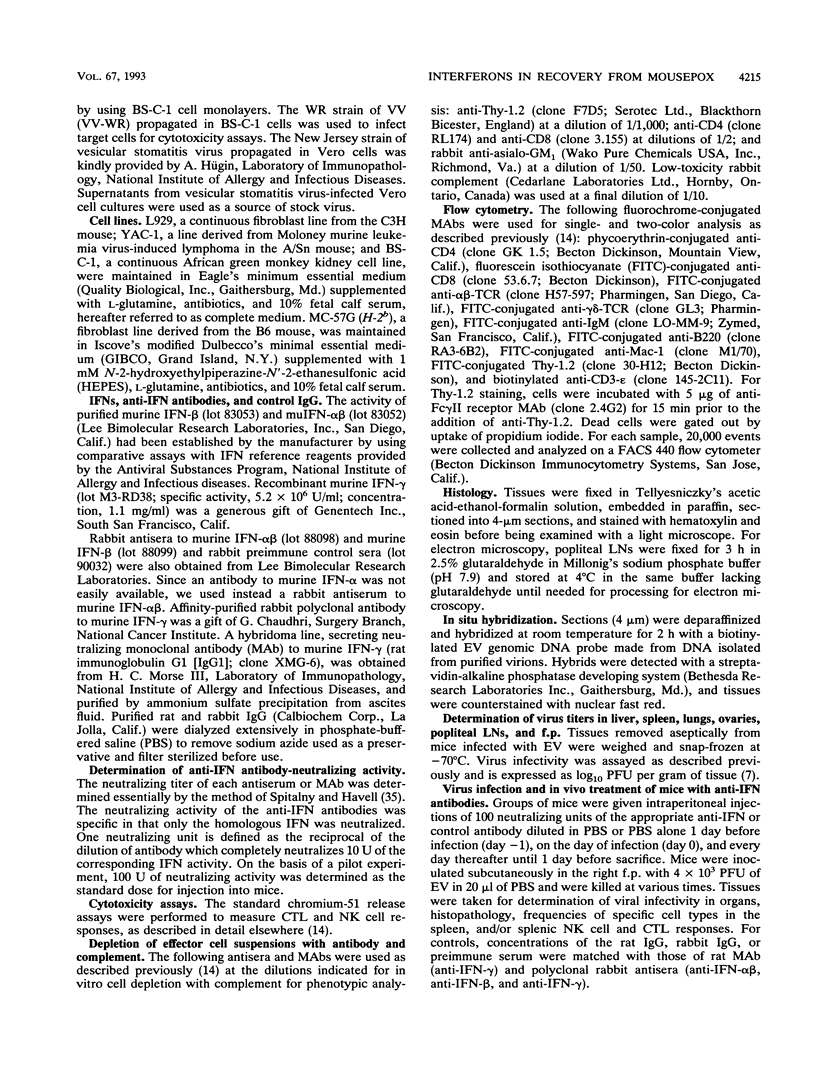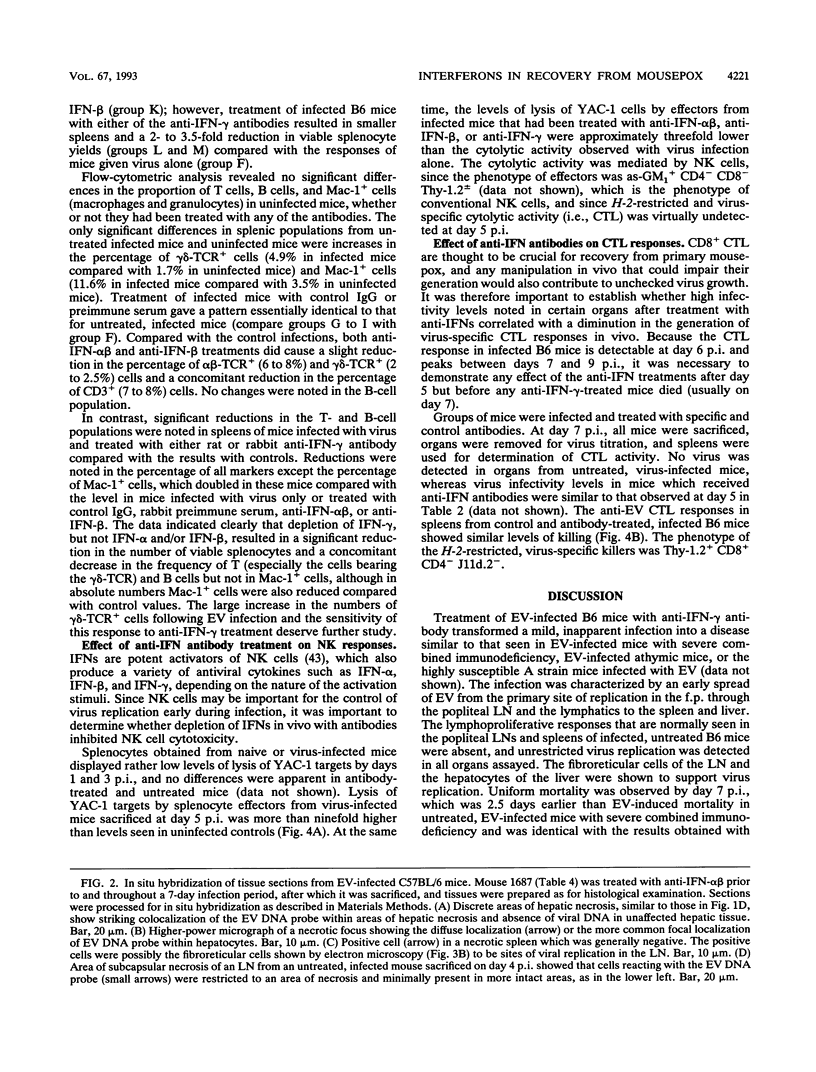Abstract
Gamma interferon is shown to be critical in recovery of C57BL/6 mice from mousepox. Anti-gamma interferon treatment of mice infected in the footpad with ectromelia virus resulted in enhanced spread to and efficient virus replication in the spleen, lungs, ovaries, and, especially, liver. All treated, infected mice died within a mean of 7 days, 2.5 days earlier than mice with severe combined immunodeficiency that were given a comparable infection. On the other hand, alpha interferon appeared not to have a major role in controlling virus replication in tissues examined, and beta interferon was important for virus clearance in the liver and ovaries but not the spleen. Either anti-alpha, beta interferon or anti-beta interferon antibody therapy resulted in only 25% mortality. Infected control mice survived but showed persistence of ectromelia virus at the site of infection (the footpad) and transient presence of the virus in the spleen, liver, lungs, and ovaries and in the fibroreticular but not lymphoid cells of the draining popliteal lymph node. Depletion of gamma interferon but not alpha and/or beta interferon resulted in a significant reduction in the numbers of splenic T (especially gamma delta-TCR+), B, and Mac-1+ cells, although the proportion of Mac-1+ cells in the spleen increased compared with control values. Depletion of alpha, beta, or gamma interferons did not severely affect the generation of virus-specific cytotoxic T-lymphocyte responses or natural killer cell cytolytic activity. This study, in which a natural virus disease model was used, underscores the crucial importance of gamma interferon in virus clearance at all stages of infection and in all tissues tested except the primary site of infection, where virus clearance appears to be delayed.
Full text
PDF












Images in this article
Selected References
These references are in PubMed. This may not be the complete list of references from this article.
- Alcamí A., Smith G. L. A soluble receptor for interleukin-1 beta encoded by vaccinia virus: a novel mechanism of virus modulation of the host response to infection. Cell. 1992 Oct 2;71(1):153–167. doi: 10.1016/0092-8674(92)90274-g. [DOI] [PubMed] [Google Scholar]
- Beattie E., Tartaglia J., Paoletti E. Vaccinia virus-encoded eIF-2 alpha homolog abrogates the antiviral effect of interferon. Virology. 1991 Jul;183(1):419–422. doi: 10.1016/0042-6822(91)90158-8. [DOI] [PubMed] [Google Scholar]
- Buller R. M., Holmes K. L., Hügin A., Frederickson T. N., Morse H. C., 3rd Induction of cytotoxic T-cell responses in vivo in the absence of CD4 helper cells. Nature. 1987 Jul 2;328(6125):77–79. doi: 10.1038/328077a0. [DOI] [PubMed] [Google Scholar]
- Buller R. M., Palumbo G. J. Poxvirus pathogenesis. Microbiol Rev. 1991 Mar;55(1):80–122. doi: 10.1128/mr.55.1.80-122.1991. [DOI] [PMC free article] [PubMed] [Google Scholar]
- Chang H. W., Watson J. C., Jacobs B. L. The E3L gene of vaccinia virus encodes an inhibitor of the interferon-induced, double-stranded RNA-dependent protein kinase. Proc Natl Acad Sci U S A. 1992 Jun 1;89(11):4825–4829. doi: 10.1073/pnas.89.11.4825. [DOI] [PMC free article] [PubMed] [Google Scholar]
- Chen W., Drillien R., Spehner D., Buller R. M. Restricted replication of ectromelia virus in cell culture correlates with mutations in virus-encoded host range gene. Virology. 1992 Apr;187(2):433–442. doi: 10.1016/0042-6822(92)90445-u. [DOI] [PubMed] [Google Scholar]
- Davies M. V., Elroy-Stein O., Jagus R., Moss B., Kaufman R. J. The vaccinia virus K3L gene product potentiates translation by inhibiting double-stranded-RNA-activated protein kinase and phosphorylation of the alpha subunit of eukaryotic initiation factor 2. J Virol. 1992 Apr;66(4):1943–1950. doi: 10.1128/jvi.66.4.1943-1950.1992. [DOI] [PMC free article] [PubMed] [Google Scholar]
- FENNER F. Mouse-pox; infectious ectromelia of mice; a review. J Immunol. 1949 Dec;63(4):341–373. [PubMed] [Google Scholar]
- Fleischmann W. R., Jr, Fleischmann C. M., Fiers W. Potentiation of interferon action by mixtures of recombinant DNA-derived human interferons. Antiviral Res. 1984 Dec;4(6):357–360. doi: 10.1016/0166-3542(84)90007-x. [DOI] [PubMed] [Google Scholar]
- Jacoby R. O., Bhatt P. N., Brownstein D. G. Evidence that NK cells and interferon are required for genetic resistance to lethal infection with ectromelia virus. Arch Virol. 1989;108(1-2):49–58. doi: 10.1007/BF01313742. [DOI] [PubMed] [Google Scholar]
- Jindal S., Young R. A. Vaccinia virus infection induces a stress response that leads to association of Hsp70 with viral proteins. J Virol. 1992 Sep;66(9):5357–5362. doi: 10.1128/jvi.66.9.5357-5362.1992. [DOI] [PMC free article] [PubMed] [Google Scholar]
- Karupiah G., Blanden R. V., Ramshaw I. A. Interferon gamma is involved in the recovery of athymic nude mice from recombinant vaccinia virus/interleukin 2 infection. J Exp Med. 1990 Nov 1;172(5):1495–1503. doi: 10.1084/jem.172.5.1495. [DOI] [PMC free article] [PubMed] [Google Scholar]
- Karupiah G., Coupar B. E., Andrew M. E., Boyle D. B., Phillips S. M., Müllbacher A., Blanden R. V., Ramshaw I. A. Elevated natural killer cell responses in mice infected with recombinant vaccinia virus encoding murine IL-2. J Immunol. 1990 Jan 1;144(1):290–298. [PubMed] [Google Scholar]
- Karupiah G., Woodhams C. E., Blanden R. V., Ramshaw I. A. Immunobiology of infection with recombinant vaccinia virus encoding murine IL-2. Mechanisms of rapid viral clearance in immunocompetent mice. J Immunol. 1991 Dec 15;147(12):4327–4332. [PubMed] [Google Scholar]
- Kees U., Blanden R. V. A single genetic element in H-2K affects mouse T-cell antiviral function in poxvirus infection. J Exp Med. 1976 Feb 1;143(2):450–455. doi: 10.1084/jem.143.2.450. [DOI] [PMC free article] [PubMed] [Google Scholar]
- Klavinskis L. S., Geckeler R., Oldstone M. B. Cytotoxic T lymphocyte control of acute lymphocytic choriomeningitis virus infection: interferon gamma, but not tumour necrosis factor alpha, displays antiviral activity in vivo. J Gen Virol. 1989 Dec;70(Pt 12):3317–3325. doi: 10.1099/0022-1317-70-12-3317. [DOI] [PubMed] [Google Scholar]
- Kohonen-Corish M. R., King N. J., Woodhams C. E., Ramshaw I. A. Immunodeficient mice recover from infection with vaccinia virus expressing interferon-gamma. Eur J Immunol. 1990 Jan;20(1):157–161. doi: 10.1002/eji.1830200123. [DOI] [PubMed] [Google Scholar]
- Kotwal G. J., Isaacs S. N., McKenzie R., Frank M. M., Moss B. Inhibition of the complement cascade by the major secretory protein of vaccinia virus. Science. 1990 Nov 9;250(4982):827–830. doi: 10.1126/science.2237434. [DOI] [PubMed] [Google Scholar]
- Leist T. P., Eppler M., Zinkernagel R. M. Enhanced virus replication and inhibition of lymphocytic choriomeningitis virus disease in anti-gamma interferon-treated mice. J Virol. 1989 Jun;63(6):2813–2819. doi: 10.1128/jvi.63.6.2813-2819.1989. [DOI] [PMC free article] [PubMed] [Google Scholar]
- Lucin P., Pavić I., Polić B., Jonjić S., Koszinowski U. H. Gamma interferon-dependent clearance of cytomegalovirus infection in salivary glands. J Virol. 1992 Apr;66(4):1977–1984. doi: 10.1128/jvi.66.4.1977-1984.1992. [DOI] [PMC free article] [PubMed] [Google Scholar]
- O'Neill H. C., Blanden R. V. Mechanisms determining innate resistance to ectromelia virus infection in C57BL mice. Infect Immun. 1983 Sep;41(3):1391–1394. doi: 10.1128/iai.41.3.1391-1394.1983. [DOI] [PMC free article] [PubMed] [Google Scholar]
- O'Neill H. C., Blanden R. V., O'Neill T. J. H-2-linked control of resistance to ectromelia virus infection in B10 congenic mice. Immunogenetics. 1983;18(3):255–265. doi: 10.1007/BF00952964. [DOI] [PubMed] [Google Scholar]
- O'Neill H. C., Brenan M. A role for early cytotoxic T cells in resistance to ectromelia virus infection in mice. J Gen Virol. 1987 Oct;68(Pt 10):2669–2673. doi: 10.1099/0022-1317-68-10-2669. [DOI] [PubMed] [Google Scholar]
- Palumbo G. J., Glasgow W. C., Buller R. M. Poxvirus-induced alteration of arachidonate metabolism. Proc Natl Acad Sci U S A. 1993 Mar 1;90(5):2020–2024. doi: 10.1073/pnas.90.5.2020. [DOI] [PMC free article] [PubMed] [Google Scholar]
- Palumbo G. J., Pickup D. J., Fredrickson T. N., McIntyre L. J., Buller R. M. Inhibition of an inflammatory response is mediated by a 38-kDa protein of cowpox virus. Virology. 1989 Sep;172(1):262–273. doi: 10.1016/0042-6822(89)90128-1. [DOI] [PubMed] [Google Scholar]
- Pestka S., Langer J. A., Zoon K. C., Samuel C. E. Interferons and their actions. Annu Rev Biochem. 1987;56:727–777. doi: 10.1146/annurev.bi.56.070187.003455. [DOI] [PubMed] [Google Scholar]
- Poo W. J., Conrad L., Janeway C. A., Jr Receptor-directed focusing of lymphokine release by helper T cells. Nature. 1988 Mar 24;332(6162):378–380. doi: 10.1038/332378a0. [DOI] [PubMed] [Google Scholar]
- Ray C. A., Black R. A., Kronheim S. R., Greenstreet T. A., Sleath P. R., Salvesen G. S., Pickup D. J. Viral inhibition of inflammation: cowpox virus encodes an inhibitor of the interleukin-1 beta converting enzyme. Cell. 1992 May 15;69(4):597–604. doi: 10.1016/0092-8674(92)90223-y. [DOI] [PubMed] [Google Scholar]
- Robertson M. Antigen processing. Proteasomes in the pathway. Nature. 1991 Sep 26;353(6342):300–301. doi: 10.1038/353300a0. [DOI] [PubMed] [Google Scholar]
- Rosa F., Hatat D., Abadie A., Fellous M. Regulation of histocompatibility antigens by interferon. Ann Inst Pasteur Immunol. 1985 Jan-Feb;136C(1):103–119. [PubMed] [Google Scholar]
- Ruby J., Ramshaw I. The antiviral activity of immune CD8+ T cells is dependent on interferon-gamma. Lymphokine Cytokine Res. 1991 Oct;10(5):353–358. [PubMed] [Google Scholar]
- Samuel C. E. Antiviral actions of interferon. Interferon-regulated cellular proteins and their surprisingly selective antiviral activities. Virology. 1991 Jul;183(1):1–11. doi: 10.1016/0042-6822(91)90112-o. [DOI] [PubMed] [Google Scholar]
- Sibille C., Gould K., Hämmerling G., Townsend A. A defect in the presentation of intracellular viral antigens is restored by interferon-gamma in cell lines with impaired major histocompatibility complex class I assembly. Eur J Immunol. 1992 Feb;22(2):433–440. doi: 10.1002/eji.1830220222. [DOI] [PubMed] [Google Scholar]
- Smith C. A., Davis T., Anderson D., Solam L., Beckmann M. P., Jerzy R., Dower S. K., Cosman D., Goodwin R. G. A receptor for tumor necrosis factor defines an unusual family of cellular and viral proteins. Science. 1990 May 25;248(4958):1019–1023. doi: 10.1126/science.2160731. [DOI] [PubMed] [Google Scholar]
- Spitalny G. L., Havell E. A. Monoclonal antibody to murine gamma interferon inhibits lymphokine-induced antiviral and macrophage tumoricidal activities. J Exp Med. 1984 May 1;159(5):1560–1565. doi: 10.1084/jem.159.5.1560. [DOI] [PMC free article] [PubMed] [Google Scholar]
- Springer T. A. Adhesion receptors of the immune system. Nature. 1990 Aug 2;346(6283):425–434. doi: 10.1038/346425a0. [DOI] [PubMed] [Google Scholar]
- Tsuru S., Kitani H., Seno M., Abe M., Zinnaka Y., Nomoto K. Mechanism of protection during the early phase of a generalized viral infection. I. Contribution of phagocytes to protection against ectromelia virus. J Gen Virol. 1983 Sep;64(Pt 9):2021–2026. doi: 10.1099/0022-1317-64-9-2021. [DOI] [PubMed] [Google Scholar]
- Upton C., Macen J. L., Schreiber M., McFadden G. Myxoma virus expresses a secreted protein with homology to the tumor necrosis factor receptor gene family that contributes to viral virulence. Virology. 1991 Sep;184(1):370–382. doi: 10.1016/0042-6822(91)90853-4. [DOI] [PubMed] [Google Scholar]
- Upton C., Mossman K., McFadden G. Encoding of a homolog of the IFN-gamma receptor by myxoma virus. Science. 1992 Nov 20;258(5086):1369–1372. doi: 10.1126/science.1455233. [DOI] [PubMed] [Google Scholar]
- Wallace G. D., Buller R. M. Kinetics of ectromelia virus (mousepox) transmission and clinical response in C57BL/6j, BALB/cByj and AKR/J inbred mice. Lab Anim Sci. 1985 Feb;35(1):41–46. [PubMed] [Google Scholar]
- Welsh R. M. Natural killer cells and interferon. Crit Rev Immunol. 1984;5(1):55–93. [PubMed] [Google Scholar]
- Wille A., Gessner A., Lother H., Lehmann-Grube F. Mechanism of recovery from acute virus infection. VIII. Treatment of lymphocytic choriomeningitis virus-infected mice with anti-interferon-gamma monoclonal antibody blocks generation of virus-specific cytotoxic T lymphocytes and virus elimination. Eur J Immunol. 1989 Jul;19(7):1283–1288. doi: 10.1002/eji.1830190720. [DOI] [PubMed] [Google Scholar]
- Yang Y., Waters J. B., Früh K., Peterson P. A. Proteasomes are regulated by interferon gamma: implications for antigen processing. Proc Natl Acad Sci U S A. 1992 Jun 1;89(11):4928–4932. doi: 10.1073/pnas.89.11.4928. [DOI] [PMC free article] [PubMed] [Google Scholar]
- Zerial A., Hovanessian A. G., Stefanos S., Huygen K., Werner G. H., Falcoff E. Synergistic activities of type I (alpha, beta) and type II (gamma) murine interferons. Antiviral Res. 1982 Sep;2(4):227–239. doi: 10.1016/0166-3542(82)90045-6. [DOI] [PubMed] [Google Scholar]





